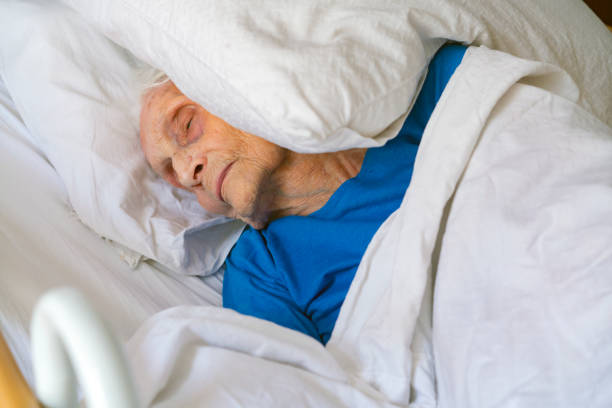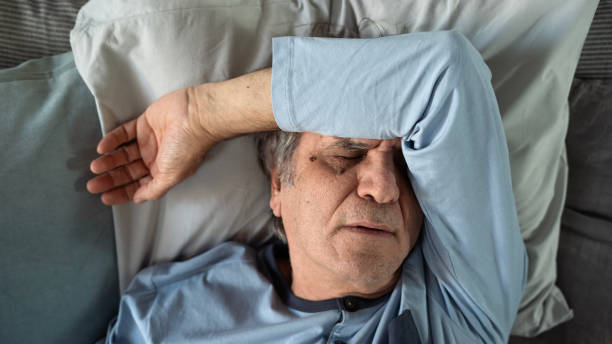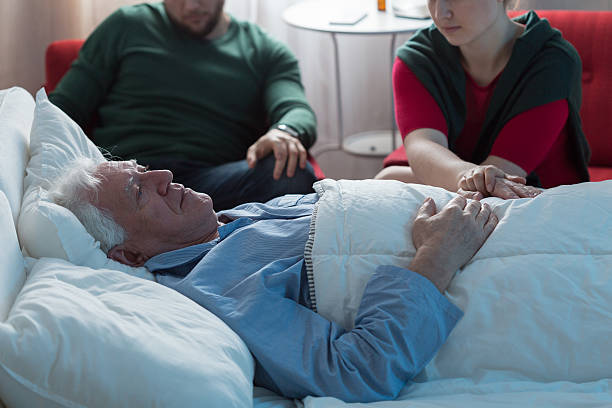Introduction

When it comes to Parkinson's disease, managing the symptoms and improving the quality of life becomes paramount. One crucial aspect often overlooked is the impact of sleep disturbances on individuals with Parkinson's. Sleep disruptions, such as insomnia, restless legs syndrome, and frequent nighttime awakenings, can further exacerbate the challenges that those living with the condition already face.
Recognizing this, researchers and designers have taken a proactive approach, delving into bedding innovations tailored to alleviate discomfort and enhance sleep quality for individuals with Parkinson's. This blog post will discuss recent advances in bedding technology that can help people with Parkinson's get better sleep and much-needed relief.
What is Parkinson's disease?
The disease that is called Parkinson's is a type of neurological disorder that affects movement, speech, and thinking, and it gets worse over time. The condition occurs when nerve cells responsible for producing dopamine (a chemical messenger in the brain) are damaged or die. Symptoms of Parkinson's can include tremors, slow movement, stiffness of the limbs, and balance problems.
Sleep Challenges in Parkinson's Disease

Bedding innovations are an important part of managing sleep challenges in Parkinson's disease. To alleviate pain and discomfort caused by movement disorders, using the appropriate mattress, pillow, and bedding materials to provide adequate support for different sleeping positions is helpful. A good bed setup can also help to ensure that nighttime awakenings do not disrupt sleep quality.
When selecting bedding for Parkinson's patients, it is important to consider their needs. A mattress should balance support and comfort while cushioning areas prone to pain or pressure points. Memory foam mattresses are often recommended for individuals with mobility impairments because they provide uniform support to the entire body. However, be sure to compare the ease of moving on this type of surface with other mattress types. Take advantage of trial periods to experience firsthand which syrface best meets the needs. Pillows may also be helpful, particularly those with adjustable loft heights that can help to maintain the desired sleeping position.
Regarding bedding materials, breathable fabrics like cotton and bamboo are ideal for keeping body temperature regulated throughout the night. Additionally, hypoallergenic options like silk or organic wool may be beneficial if allergies are an issue. Alternately, look for friction-reducing sheet and sleep garment combinations that facilitate repositioning including getting in and out of bed. With the right setup, Parkinson's patients can get comfortable and enjoy restful sleep.
Bedding innovations provide an opportunity to increase comfort and reduce the effects of insomnia in people living with Parkinson's disease. They can improve their sleep quality and well-being by selecting the appropriate mattress, pillow, and bedding materials. By investing some effort and using creativity, it can be possible to make a calming environment that could improve sleep.
Importance of Quality Bedding for Parkinson's Sleep Comfort

There are several aspects of quality bedding to consider when selecting the best option for Parkinson's sleep comfort. Support is key, as many individuals with PD struggle with muscle weakness and tremors, so choosing a mattress or bedding solution that effectively holds the body in place can be beneficial. In addition, quality materials such as memory foam or latex are well-suited for individuals with Parkinson's, as they can better conform to the body and provide targeted support. Also of great importance is to test the ease of moving on the different mattress options as the ability to move freely is affected by Parkinson’s disease.
Choosing a mattress that promotes breathability is important to reduce the effects of nighttime restlessness. Temperature control can also be beneficial, especially during hot summer months when sweating can worsen sleep quality. Additionally, considering the size of one's bed and the amount of space needed to move comfortably is important. Individuals with Parkinson's may benefit from a larger bed or one with adjustable features, such as adjustable head and foot elevation.
Finally, soft materials that feel pleasant against the skin can also benefit individuals with Parkinson's who are more sensitive to textures. Materials such as cotton or bamboo can provide both comfort and breathability. However, compared to the ulta-smoothness of certain synthetic fibers, moving is made more difficult due to the frictional resistance inherent in natural fibers. Friction-reducing sleep garment and sheet sets form a system that facilitates repositioning thereby enhancing freedom of movement and often improved sleep. Selecting quality bedding that considers these factors can greatly improve sleep comfort for individuals with Parkinson's disease.
Quality bedding is essential to good sleep hygiene, especially for those with PD. Taking the time to select the right bedding solution can help reduce nighttime restlessness and enhance overall comfort. Investing in high-quality bedding can benefit individuals with Parkinson's disease, leading to improved sleep, better daytime performance, and a better quality of life.
Sleep Challenges for Those with Parkinson's Disease
Sleep problems are a common issue for those living with Parkinson's Disease. Studies indicate that up to 95% of individuals diagnosed with a condition may encounter difficulties with insomnia, sleep maintenance, or excessive daytime sleepiness.
The cause of sleep disturbances in Parkinson's is still largely unknown, but some experts suggest that the neurological changes associated with the disease can disrupt both the circadian rhythms that control sleep and wakefulness and the body's ability to produce hormones like melatonin.
Difficulty falling asleep may be caused by agitation, feeling overwhelmed or anxious, and medication side effects. Staying asleep can be challenging due to recurrent awakening caused by movement or leg spasms, sleep apnea, and frequent urination urges.
Parkinson's patients may also experience excessive daytime sleepiness caused by the disease, medications used to treat motor symptoms or a combination of both.
Some strategies can help those with Parkinson's better manage their sleep problems. Working with a doctor to identify and address any underlying physical or psychological causes of sleep disturbances is an important first step.
Practicing good sleep hygiene habits can also help. This includes avoiding caffeine, limiting exposure to bright screens before bed, eliminating naps during the day, exercising regularly, eating healthy meals, and creating a consistent sleep and wake schedule.
Finally, if self-help strategies don't work, doctors may suggest medication to help regulate sleep patterns. Non-drug therapies such as acupuncture or massage therapy can also be beneficial in addressing sleep problems associated with Parkinson's disease.
Living with Parkinson's is sure to bring unique challenges but with the right combination of medical and lifestyle strategies, those dealing with sleep issues can find relief.
Are any resources available to help provide more information on bedding innovations for Parkinson's sleep comfort?
Several resources are available to provide more information on bedding innovations for Parkinson's sleep comfort. The National Sleep Foundation offers various tips and advice on managing sleep problems related to Parkinson's Disease.
Additionally, the American Parkinson's Disease Association provides information on understanding and treating the sleep issues associated with the disease. For individuals looking for bedding options to help improve sleep comfort, the Parkinson's Disease Foundation has several resources on products and therapies designed specifically for people with Parkinson's.
WebMD and similar websites offer useful tips on how to make your sleeping environment comfortable. It is crucial to acknowledge that individuals have varying preferences; therefore, what is comfortable for one person might not be comfortable for another.
Therefore, it is recommended that individuals speak with their doctor before purchasing any bedding products to ensure the product is suitable for their needs. With the right resources and products in place, individuals can rest comfortably, knowing they have taken steps to improve their sleep quality and overall health.
How can I help my Parkinson's patient sleep at night?
Multiple strategies are available to assist a Parkinson's patient get a good night's sleep.
Establish a consistent bedtime routine:
A predictable, calming bedtime routine is key for those with Parkinson's. Consider activities like taking a warm shower or bath, stretching, reading a book (or listening to an audiobook), and listening to soothing music.
Avoid caffeine and other stimulants:
Caffeine can cause difficulty sleeping, so avoiding coffee, tea, soda, energy drinks, chocolate, and other caffeinated foods or beverages in the evening is best. Additionally, avoiding nicotine at night is important as it causes sleep disruption.
Create a comfortable sleeping environment:
Ensuring the room is cool and dark is recommended, and quieting an eye mask to block light can help prevent sleep disturbances. You may find using a white noise machine or fan as background noise helpful in promoting calmness. Invest in comfortable pillows and bedding that promote comfort during restorative sleep. Friction-minimizing sheets and sleepwear sets are also effective in improving bed mobility, comfort and sleep.
Exercise regularly:
Regular exercise can help your Parkinson's patient sleep better, but avoiding exercising too close to bedtime is important. Try to finish any exercise at least two hours before going to bed.
Keep the lights low:
Keep the lighting dim in the evening, and avoid using electronic devices with bright screens, like TVs, computers, and tablets.
Talk to your doctor:
If your Parkinson's patient is still having difficulty sleeping, it's important to speak with their doctor, who can recommend medications or therapies that may be beneficial.
These strategies can assist you in ensuring that your loved one with Parkinson's disease can get adequate rest, essential for maintaining their overall well-being.
FAQ's
What are the best bed sheets for Parkinson's patients?
The best bed sheets for Parkinson's patients are designed to provide comfort, mobility and support. Beds with adjustable firmness settings and temperature-regulating fabrics such as bamboo or Telcel may be beneficial. Padding on the mattress can help reduce pressure points, and memory foam mattresses can help absorb movement from nighttime tremors. Also, having multiple bedding layers can help keep patients warm and comfortable throughout the night.
How do you make someone with Parkinson's more comfortable?
Creating a comfortable sleep environment for someone with Parkinson's starts with the right bedding. Investing in good quality, adjustable bed sheets can provide comfort and support for the individual.
What is wearable for Parkinson's disease?
Wearable technology for Parkinson's disease can help improve quality of life. Wearable sensors and devices can measure movement, sleep patterns, and medication adherence to provide real-time data for treatment planning.
What is the wearable device for Parkinson's?
The most common wearable device for Parkinson's is Park Insight, which uses sensors to monitor movement and detect tremor activity. It also tracks sleep cycles and medication adherence and can alert users when they need to take breaks from activities. When changing bedding or sleepwear, use this wearable device to monitor differences in movement and sleep between the difference items that are tried. The results can be helpful in guiding the optimal choices to meet your needs. Healthcare professionals can be provided with this information to make necessary changes to treatment plans.
What is the new technology to aid people with Parkinson's?
Individuals with Parkinson's disease are receiving assistance from technology through the use of virtual reality (VR) headsets in their physical therapy sessions. These VR systems use video-based exercises to engage and motivate patients while providing real-time feedback on how well they are performing each exercise. Additionally, wearable sensors provide clinicians with patient progress data throughout the day. This data can be used to adjust therapy plans and help reduce the severity of symptoms.
What is the new Parkinson's vibration therapy?
Vibration therapy for Parkinson's is a new treatment that uses low-frequency vibrations to improve limb mobility. Studies have demonstrated that this therapy can enhance muscle strength, decrease spasticity, and minimize tremors. Studies have also found that vibration therapy can help improve balance in patients with Parkinson's.
What stops Parkinson's tremors?
Regrettably, there isn't a single solution that can eliminate tremors resulting from Parkinson's disease. Different medications may be used to reduce the severity of tremors, but they can also cause other side effects. Other treatments, such as physical and vibration therapy, may also help reduce tremor activity. To reduce the severity of tremors, lifestyle changes such as exercising regularly, managing stress levels, and avoiding caffeine may be helpful.
Conclusion
I hope this article's insights will improve the sleeping experience of individuals with Parkinson's and enhance the quality of care they receive. You can improve your loved one's quality of life and promote independence by using innovative bedding, wearable devices, and therapies.

